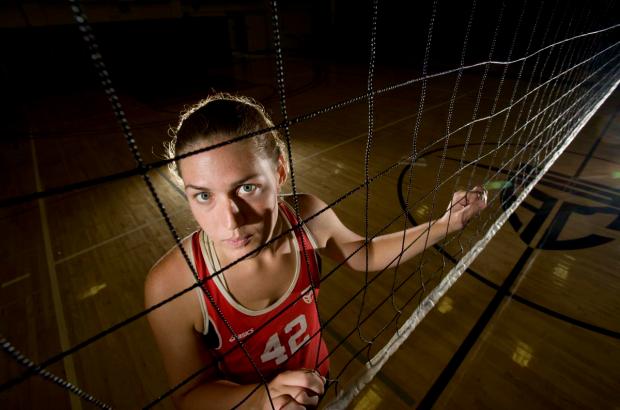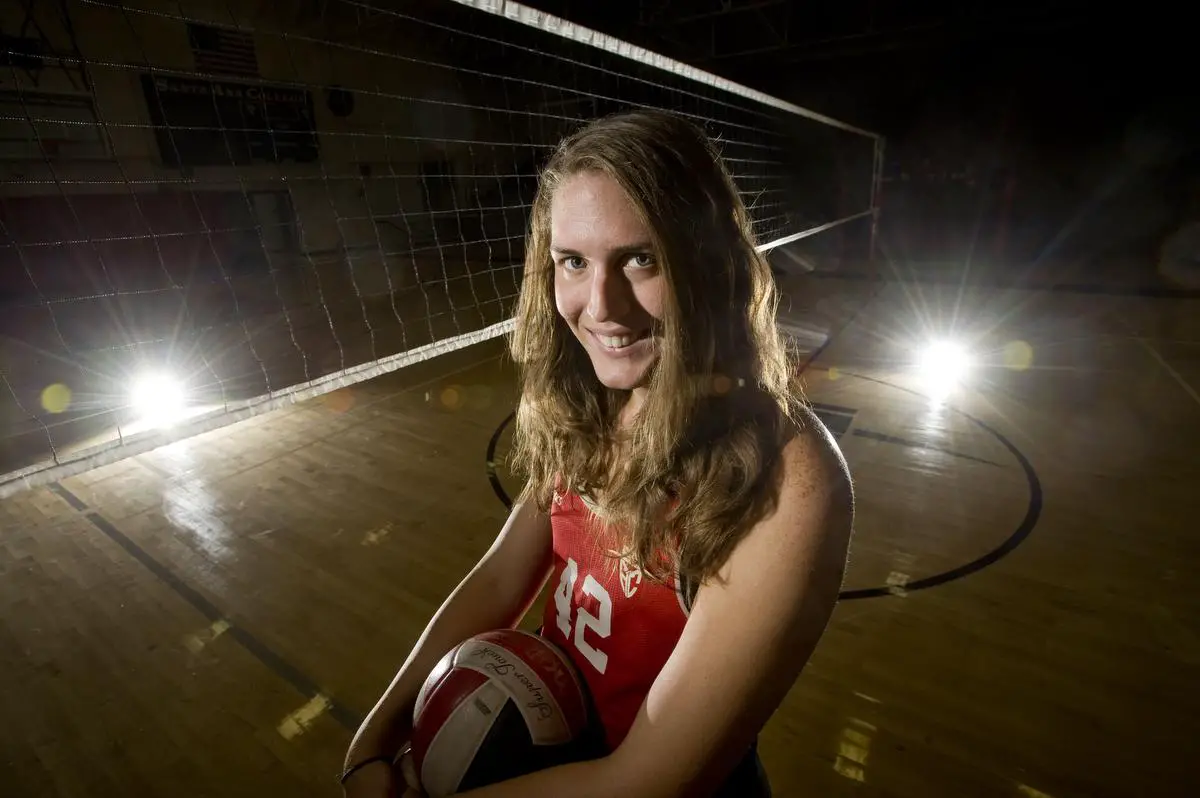Every athlete will tell you how hard they’ve had to train to be as good as they are, but for Chloe Psyche Anderson, that journey involved more hardships than most athletes have to deal with. At birth, Anderson was assigned as a male, but later discovered that she had been a girl all along. In high school, she decided to come out as transgender, and didn’t let that stop her from doing the things she loved, including playing volleyball and track and field.
In fact, coming out wasn’t the hindrance that some people might expect; it was a freeing act that ultimately made Anderson happier. That doesn’t mean, however, that her transition didn’t come with its own troubles. Going through hormonal treatments, Anderson had to deal with how her body transformed and adapt from playing as a person with high levels of testosterone, to one with little to no testosterone at all—less than most cisgender females.
It was difficult both physically and emotionally to transition and play, but Anderson endured to go on to play women’s volleyball at Santa Ana College and UC Santa-Cruz. She chronicles her path from high school to college as a transgender athlete in an article she wrote here, but just under a year later, Anderson is giving up athletics to help herself and other transgender students.

“I never doubted I could be an athlete and transition. I just had to do extensive research prior to make sure I fit into the associations legally, but my body and I have had a long and frustrating relationship to say the least. Having low doses of testosterone for a long time has made building up muscle much more of a challenge than [it is for] my teammates, as well as muscle recovery time. I always find myself under-achieving and having to push through most of the pain to try and feel like I can. This past season, I underestimated my mental strength, as I felt isolated on the team from almost all sides no matter how hard I tried to reach out. I actually began to dissociate during practice and couldn’t focus on anything. My biggest physical strengths were my ability to keep on pushing through continuously. Everything was a burst of energy that my body struggled to recover from.”
“As a transgender athlete, I have felt that I’ve been struggling to fight an uphill battle against stereotypes that I am physically superior to my teammates and that I’m not like them. While the physical superiority couldn’t be more false, the reality that I am very different than my teammates couldn’t be more obvious.”
“Women’s volleyball very much enforces women to be more along the lines of standard binary norms, so I didn’t fit in very well with anyone. Most of my teammates are heterosexual, cisgender and monogamous, all of which I am not. They were all more or less groomed by those around them since birth to be molded into this sort of expectation that society expects of women, let alone what a women’s volleyball player should be. People tell me I picked the pretty-girl sport—the sport of ‘models,’ more or less. I’ve never been exposed to the culture of popular girls, let alone those who are young enough and shallow enough to let it control their entire existence. I’ve come a very long way from when I once was, but societal norms and expectations of both males and females is something I personally cannot partake in.”
“At Santa Ana College, most of my teammates were wonderful and my coach and I had an overall pretty solid relationship despite some hard times. After transferring to UCSC however, things became a little bit more complicated. I never really made and friends, and I never felt like I clicked with my coach. There was just so little in common I had with everyone that my time through the season was painful and isolating, reasons more or less why I’m not going to be playing again next year.”
“Honestly, I wasn’t in a very good place emotionally when writing the original article, either. Writing is something that has always brought some sense of relief, and it was me processing my previous season and experiences with myself; having some sort of way to process and acknowledge some things that have happened helped me prepare to move forward, something I wouldn’t mind doing now honestly.”
“Since then things have not been positive. With only a few weeks left in my season, I had to pull out for my own emotional stability. Something I have been fairly private about is that I attempted suicide during this last season, and it seemed as if nobody even cared on the team. To know that I sank so low and yet I was still treated fairly horribly only fueled my desire to leave the team. I only attended two more games after, and they were our last two home games.”

“However, I would like trans athletes to know that if they intend to go forward in women’s volleyball that they’re not alone. I have had my own ups and downs, and feeling alone like I have was challenging and difficult. If any new athletes come forth I would happily help talk them through any of their issues, and do what I can to ensure the next generation of collegiate transgender athletes can and will succeed. It’s a fight, and I want to help out in the battle.”
“I have had a number of transgender athletes approach me since coming out publicly, only two of which are in volleyball and only one of which is planning on playing for a college team this next fall. I’m really happy they have reached out, and it’s helped me knowing that I helped inspire some to go for their dreams.”
“In the future, I would love to help out with transgender youth if possible and continue to do what I can to help the community that I’ve so fondly grown to love.”
Even though Anderson has dropped volleyball at UCSC, she hopes to transfer to a school that’s a better fit. Beyond being an athlete, Anderson is a proud LARPer who creates her own costumes, and even though she’s currently getting out of a depression due to her hardships in college athletics, Anderson is ultimately a happier person for being an out transgender athlete.
“I am myself. I got to experience playing the sport I love with many wonderful people. I felt like, for the first time in years, my life was going the way I wanted it to be. I don’t want to hide who I am to anyone. Nobody should be put into a situation where they should feel ashamed or belittled for who they are.”












For anyone who wants to help the transgender community fight intolerance, here’s a GoFundMe campaign for an awesome nonprofit I’ve supported in the past:
https://www.gofundme.com/help-save-gender-justice-nevada
“I’ve never been exposed to the culture of popular girls, let alone those who are young enough and shallow enough to let it control their entire existence.”
I wonder if those girls would agree with this characterisation of them? Something tells me they wouldn’t. This has a real whiff of bitter misogynistic assumption about it.
I agree.
Something about that passage (and the whole “They were all more or less groomed by those around them since birth to be molded into this sort of expectation that society expects of women, let alone what a women’s volleyball player should be.”) sounds a lot like projection I’d hear onto a group of women who didn’t fit someone’s expectations and getting bitter about it instead of perhaps contemplating that they maybe don’t really, fully understand these women and their lives/experiences.
Hmm…
I think she’s talking about gender roles, not specific people. Like how women are taught to be shallow and competitive with one another, and she’s saying that she never really participated with gender roles in the first place, not that women in general are like that, either. It’s a little terfy to call a trans woman a “bitter misogynist”
Well, considering “Chloe” is a man, of COURSE you won’t find camaraderie because you aren’t a female! Get off of the women’s teams dude, these women are not your emotional servants nor potential sexual escapades, no wonder they didn’t like you. Especially calling them shallow, vapid, and bringing attention to their apparent monogamy (Seriously??? What does that have to do with anything unless “Chloe” was trying to sleep with his teammates?) – It sounds like “Chloe” wanted sexual access with these women and got shut out. This whole article reeks of male entitlement, misogyny and male projection.
“Chloe”, real women aren’t stupid, you can dress like one of us and style your hair but that doesn’t make you a woman like us. Get out of women’s sports because you aren’t female and it’s wrong to compete with real women considering you are a man. Only sick men who have sick ideas about dominating women would invade our sports, our private spaces, our shelters, support groups, and expect to be catered to.
heyo @the above commenter: you could not possibly be more wrong about this whole subject if you tried. as a person who actually knows chloe personally i can confirm that absolutely none of that shit about “just wanting to get with the girls” is true, the entire point of the comment on how shallow the general attitude is is to point out that this group has too little in common to bond in the way sports teams normally should. your whole comment reeks of cisgender entitlement, transphobia, and “soccer mom who thinks she’s powerful just because she can ground her kids sometimes” projection. oh, and a very obvious case of cowardice, given that you’d take advantage of an opportunity for anonymity to spout hateful words rather than stand by your shitty opinion with your real name. sit the fuck down and don’t dare call yourself a feminist if you’re so eager to tear down any woman who doesn’t fit your selfish personal ideals.
So “sit the fuck down and don’t dare call yourself a feminist if you’re so eager to tear down any woman who doesn’t fit your selfish personal ideals.” should be applied to both you and your friend as well assuming you both consider yourselves feminists. You should not be resorting to placing assumed soccer mom stereotype on this woman commenter and your friend should not be so severely stereotyping the whole damn volleyball team. Neither of you know their backstories as I and this commenter do not know either of yours.
Also just a point about how to avoid coming across as creepy, if you make a big stink about a whole group of people being monogamous without ANY context like “when they would talk about their SO’s I would get worried bringing up my two partners” it comes across as CREEPY. That type of context-less criticism implies that your issues with that set are either to do with sexual access (they won’t date me and their current partner) or viewing exclusivity as ‘selfish’ (they won’t be uncomfortable so I can go establish relationships/have sex with others). Combined with the fact that your average MRA basement dweller responds to rejection by projecting harsh stereotypes on women despite being of an age to know better (like 26?) your friend comes across as entitled and creepy despite the intent.
The funny part is by your comment it is easy to tell that you are male because you don’t seem to understand that an aversion to creepy over entitled males is the most basic survival instinct that the average female on the planet learns. More often than not, it is an instinct learned the hard way. If transwomen do not learn to understand the perfectly reasonable aversion that the average female is forced to learn from a young age (puberty kicks in around 9-12, at this point you understand that you can be forcibly impregnated) then the constant back and forth between so called “terfs” and so called “transactivists” will never end.
lol? sure, she doesn’t know the backstories of the people she went and spent so much time with. very logical assumption, good job. and of course when somebody is concerned about a difference in romantic preference it absolutely MUST always be because they’re interested in getting with everyone and not because, you know, it’s another thing that they don’t have in common and can’t talk freely about like a regular group of friends might. you wanna talk about entitlement? entitlement is looking at an article about a person who has jack shit to do with you and saying “no, this is about MY concerns and the whole situation has to revolve around MY issues.” wanna talk about projection? projection is insisting that a person you don’t know must without a shadow of a doubt be looking at the world the way you’ve decided they should based on the uninformed stereotypes you’ve decided to apply to them without ever bothering to actually ask what it’s like from their point of view. wanna talk about bigotry? bigotry is sitting there trying to tell everybody that you have any right spouting baseless hate for trans people by reaching for whatever buzzword you can slap onto it and calling it some sort of feminist attempt to call out “misogyny” (or, as normal people call this sort of thing, the act of a trans woman existing somewhere in the world). you wanna be a real activist in feminism? try actually directing your negativity at the people DOING the bad stuff, not the group that you’ve decided might possibly be in the same ballpark because you can name one physical attribute they share. blaming all trans people for some women being nervous about men is like blaming all black people for crime in general because somebody robbed a gas station while wearing a bob marley shirt or something. it’s a shitty, ignorant thing to do and it does absolutely nothing to help the actual problem.
oh, and while we’re on the topic of stupid assumptions that don’t actually do anything for your argument, yes i am male (congrats on reading my name), and no, that doesn’t actually make any of my points any less valid. i do plenty well understand what it’s like to see this issue from a woman’s point of view. it’s called actually taking in a conversation for the purpose of hearing it and understanding it, not just to wait to respond with whatever viewpoint i’ve already decided is “correct” beforehand. and before you try to turn that against me, keep in mind that at this point that you’re literally trying to defend somebody’s “right” to spew hate speech. not a strong stance.
oh hey also i totally blanked on this one while i was writing all that other stuff up. you know that feeling you described of women having to have an instinctual fear of men or some shit? that’s how trans people feel about people like you, what with your desperate need to excuse transphobia and treat trans people so unfairly. congratulations, you are the source of the behaviour you say excuses any and all rude ass comments. i hope you’re proud of that one.
Comment for Staff at studybreaks.com and “A Woman Speaking the Truth”:
I am concerned about one of the comments entitled “A Woman Speaking the Truth.” In my opinion, the tone of even putting “Chloe’s” name in quotation marks, as if that isn’t her real name, is troubling and dehumanizing.
I would ask that you have a code of civility for comments on your webpage. I am not arguing that individuals lack the right to share their opinions and express free speech, but this seems to go beyond the pale.
I, too, know Chloe personally. She is a bright, articulate and thoughtful student. However, even if I had not had the pleasure to know Chloe in one of my courses, I would still stand up for her.
As a professor of history, I’ve studied the struggles that many oppressed groups and marginalized individuals have faced over the centuries. What has changed these destructive, and sometimes deadly, dynamics is people speaking out regarding these issues and taking action to empower themselves, their communities and others. Hate speech, which is what the previous comment seems like TO ME, seems to lack productive action towards social justice and treating all individuals with dignity.
Respectfully,
Kristen Guzman, PhD
You completely miss the point. The point is we are stuck in a world where people perceive our actions according to the groups those people associate us with. I actually don’t care what I think, but I do care what others think because that’s where you are going to get the most issues resolved and potential harm reduced. My whole spiel has little to do with anyone’s ‘right to free speech’. It has everything to do with “this is where so and so is coming from, this is the root of the communication issues between two groups”. I’m also very entertained that you are plucking the attributes of an unsavory character and using them to describe some words that I didn’t write. I am very flattered *takes a bow*
You also seem to have completely missed the sentence where I explicitly said “despite your friend’s intent” as in I applied the benefit of the doubt to your friend.
I would argue that you don’t understand anything about the female experience. You have not grown up female. The way you compare this experience to transpeople’s shows you have very little understanding of either. Females fear men because men murder and rape women at alarming rates. You are comparing that to some randos talking on the internet who literally cannot do any physical harm to you or your friend and who have no intent to. Meanwhile transpeople also face significant physical threat from males, but the kind that they face is not similar to the kind that the average female faces. Usually the threat revolves around being gender non-conforming or homophobia and does not come with the potential to be forcibly impregnated unless talking about a transman. You are extremely dismissive of these all too real threats, maybe you should reconsider your perspective since this attitude belittles the lived reality and threats faced by these groups.
If you are going to go the “be a better feminist route” you *should* fixate on the material reality of the average woman in the world and liberate women from male oppression. Fixation on the idea of identity is extremely offensive to women who live in areas or places where you cannot identify out of being female and where this comes with fatal consequences. Some people who are Afghan and who are also relatively liberal have this perception of these politics. This is why around these people I keep quiet about my sexuality based issues. The reality is, my sexuality can be hidden and as long as spinsterhood is not considered socially unacceptable, I can get by if push comes to shove.
Whether you like to hear this or not, the consequences of homophobia and transphobia can be easily avoided by social conformity in a way that race and sex cannot be.
Either way, good luck with your day.
@equianiminity “you haven’t grown up female and you know nothing of the trans experience,” you say? i like how you keep assuming things about me. unfortunately for you, you are wrong and your whole point goes entirely out the window, lololol. anyway, here’s the deal. literally everything you’re telling me can just as easily be thrown right back in your face. you point out the whole “despite your friend’s intent” bit in the very same sentence you try to excuse all these ignorant comments by saying “yeah but we don’t MEAN to be bigots” (and btw, you CLEARLY don’t know jack shit about the trans experience if you think that there aren’t any transphobes who wholy intend to be hurtful and that trans people as a whole don’t face very real, very deadly physical danger every single day, a fact you can find many, many examples of if you ever bothered to look up news articles, for example). you yourself are plucking unsavory attributes and applying them where they never were by trying to blame trans people for you having a poor attitude because hey, your problems are just so much more important. wanna talk about “u cant be sad because there are less fortunate people in africa” or whatever? try “u cant be sad because there are less fortunate people in the trans community.” seriously, what you just said about fatal consequences for undesirable gender identity in other countries applies just as well here. both chloe and i can attest to this (but we shouldn’t have to, your desperation to put trans people down and/or defend people who do that when they haven’t done a thing to deserve it should be evidence enough of that idea).
the bottom line is this: you’re being an enormous hypocrite and your argument is a very obvious scramble to excuse hate speech and perpetuate bigoted thought in whatever way you can instead of letting trans people defend themselves from said hate speech. i mean, look at your last line. you’re literally just telling trans people that they can solve the problem of all this hatred and danger by letting themselves be oppressed, shut down, hidden away, and all in all removed from society. i bet you wouldn’t dare tell a woman to try avoiding rape by just hiding in her closet and never going out in public again. that’s a fucking disgusting attitude and you know it.
Hello! I’m the author of this piece and had the immeasurable pleasure to interview Chloe. I am saddened that anyone would question Chloe’s womanhood and criticize her for talking about her experience with heteronormativity. She is a bright, compassionate girl and she deserves to have her story told.
From talking with Chloe I know that she never said anything bad about her teammates, only that she couldn’t click with them. She never called anyone “shallow,” and as mentioned above she was talking about societal expectation and culture, not specific people.
While I appreciate everyone who takes the time to read these articles, I do not condone transphobia in any form, even when it’s under the guise of “feminism.” Please refrain from making any more transphobic comments on this article.